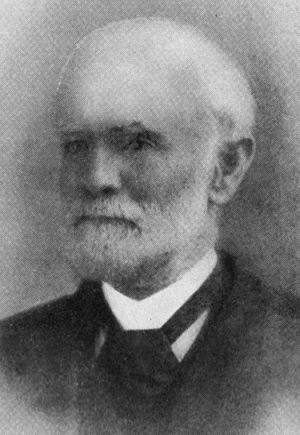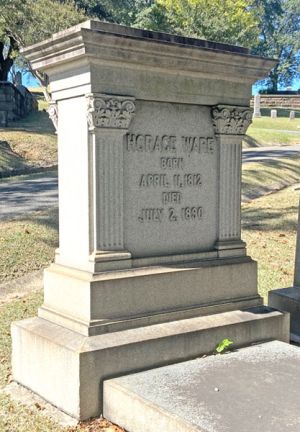Horace Ware
Horace Ware (born April 11, 1812 in Lynn, Massachusetts; died July 2, 1890) was an ironmaker and industrialist. He founded the Shelby Iron Works which supplied the Confederate Naval Arsenal at Selma during the Civil War and later recruited capital to the Birmingham District to help develop its iron and steel industry.
Ware was the only son of Jonathan and Roxana Howe Ware of Massachusetts. His father was an ironworker in mills in Massachusetts and New York. In the mid 1820s the family moved to North Carolina, and then settled on Shoal Creek in Bibb County around 1830. Jonathan Ware partnered with Edward Mahan to build a water-powered bloomery forge on the creek's bank. Horace grew up in the business and helped his father construct several other forges in the countryside. He soon took over his father's share in the business and continued to participate in the development of the state's nascent iron industry while also briefly teaching school. He married the former Martha Ann Woodruff of Spartanburg, South Carolin an June 24, 1841.
Ware proceeded to acquire iron and timber lands in Shelby County from Green and Sarah Seale in 1842 and began plans to construct a furnace on Camp Branch Creek, but lacked sufficient capital for the venture. He enlisted investment from planter John McClanahan. They began construction of a brick and stone blast furnace with a 30-foot-tall stack in 1844. It was completed in 1846 and started producing iron up to its maximum of five tons per day. A third stack was completed in 1849.
Initially, Ware's Shelby Furnace supplied the forges and smithies operating in the vicinity making horseshoes, hardware, nails and other implements for farming. The availability of iron spawned a small community of manufacturers who produced tableware, cookware and farm utensils. The region's relative lack of money meant that he often had to barter for goods in trade for his iron. In order to reach more distant markets, Ware began hauling iron to the Coosa River where it was carried by barge to Montgomery and Mobile. Notably, Ware could also Daniel Pratt, a prosperous manufacturer of cotton gins in Prattville, among his customers. Ware constructed a large home at Shelby in 1850, which survived until being destroyed by fire in 1991.
By 1856 Ware bought out McLanahan's share of the Iron Works and reincorporated in 1858. He sought new investors for a Shelby County Manufacturing Company which would produce and transport rolled iron bars. In winning a charter from the Alabama State Legislature, Ware agreed to a provision of the law that would prevent the sale of "spiritous liquors" within 3 miles of the plant. The rolling mill, Alabama's first, was completed in April 1860 and could produce 12 tons of bars each day. Along with the blast furnace and rolling mill, Ware erected a forge and foundry on site. The plant was supported by a sawmille and grist mille, as well as homes and community structures for his workers and their families. Rather than purchasing enslaved people to work at the furnace, Ware's practice was to hire them from neighboring plantations.
After the outbreak of the Civil War, Ware's iron was in high demand, but skilled labor was in very short supply, forcing him to sharply increase wages and send agents to far-flung towns to recruit workers from other ironmakers.
In 1862 Ware sold most of the company to a group of interested investors who pooled $150,000 for the transaction. A. T. Jones was made president of the company while Ware remained on the board of directors. That same year he buried Martha alongside two of their children who had died young under a large obelisk at the Columbiana Cemetery. He also supervised the casting of an iron fence and gate which surrounds their plot there.
Horace Ware remarried in 1863 to the former Mary Roper Harris of Columbiana. His parents had joined him in Alabama during the war. His father died in May 1864 and his mother died at Sixmile in 1874. They were buried together in Talladega's Oak Hill Cemetery, where Horace's son John was editor of the Our Mountain Home newspaper.
With the influx of capital, the Shelby furnace was enlarged and a rail line to Columbiana was laid. Shelby iron supplied the Confederate Naval Works at Selma, and was used to clad the C.S.S. Tennessee. In April 1865 Union cavalry corps led by Brigadier General James H. Wilson reached the district and destroyed the furnace works and rail line.
Ware and John Lapsley began the process of rebuilding the furnace with new northern backers in 1867. Ware also ventured to rebuild the former Salt Creek Furnace in Talladega County with an Ohio investor. Their Alabama Furnace Company was reorganized as the Clifton Iron Company. In 1884 he also invested in the Sheffield Furnace Company in Franklin County.
The Shelby Manufacturing Company began to produce wheels for rail cars successfully. Ware sold his remaining stock to the other partners for $132,525 in 1881. He sold his interest in the Sheffield Company to Enoch Ensley in 1887, and made his exit from the Clifton Company in 1888. His last business venture was a furnace under development in Jefferson, Texas.
In retirement, Ware resided at a home on 20th Street and 14th Avenue North, a district then known as North Highlands. He died in July 1890 from heart failure while in bed due to a lingering illness. He was being attended at the time by his personal physician and was making conversation about "the problem of immigration," immediately prior to his sudden attack. His funeral was held at his home the following day and he was buried at Oak Hill Cemetery in Birmingham.
References
- Armes, Ethel (1910) The Story of Coal and Iron in Alabama. Birmingham: Birmingham Chamber of Commerce
- Woodward, Joseph II (1940) Alabama Blast Furnaces. Birmingham: Woodward Iron Company. reprinted 2007 by University of Alabama Press. ISBN 0817354328
- Wallace, Richard D. (1953) “A History of the Shelby Iron Company: 1865-1873.” master’s thesis, University of Alabama
- McKenzie, Robert H. (July 1973) “Horace Ware: Alabama Iron Pioneer.” Alabama Review. Vol. 26, pp. 157-172
- Seales, Bobby Joe (December 2009) "Brief History of Shelby Iron Company." Shelby County Historical Society Quarterly, pp. 2-5
- Lewis, Herbert J. (March 30, 2023) "Horace Ware" Encyclopedia of Alabama - accessed October 14, 2023

